 Petzlover
Petzlover Oriental Bicolour is originated from United States but Thai is originated from Thailand. Both Oriental Bicolour and Thai are having almost same weight. Oriental Bicolour may live 5 years less than Thai. Both Oriental Bicolour and Thai has same litter size. Both Oriental Bicolour and Thai requires Low Maintenance.
Oriental Bicolour is originated from United States but Thai is originated from Thailand. Both Oriental Bicolour and Thai are having almost same weight. Oriental Bicolour may live 5 years less than Thai. Both Oriental Bicolour and Thai has same litter size. Both Oriental Bicolour and Thai requires Low Maintenance.
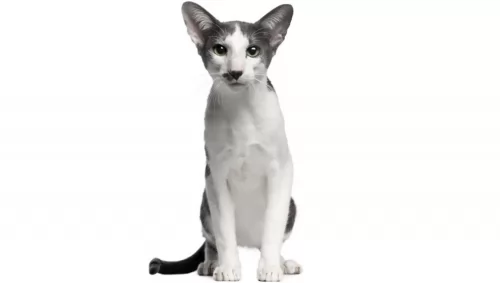 Oriental Bicolour cats owe their origins to Lindajean Grillo of Ciara Cattery. The cats hail from the United States. It was in 1979 that Grillo paired a Siamese and bicolored American Shorthair, selecting the best bicolored offspring to mate again with Siamese or Orientals.
Oriental Bicolour cats owe their origins to Lindajean Grillo of Ciara Cattery. The cats hail from the United States. It was in 1979 that Grillo paired a Siamese and bicolored American Shorthair, selecting the best bicolored offspring to mate again with Siamese or Orientals.
This particular variety was granted recognition in 1983 by TICA. It was during the 1980s that European breeders started their own Oriental bicolor breeding lines. The first modern Oriental Bicolours were imported to the UK during 2004.
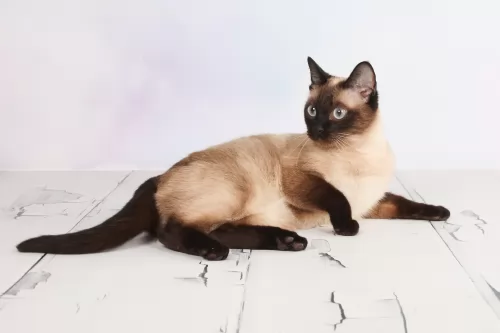 The Thai cat is also referred to as the Wichien Maat. It is an old cat breed descended from the cats of Thailand.
The Thai cat is also referred to as the Wichien Maat. It is an old cat breed descended from the cats of Thailand.
The Wichienmaat is a cat that was spoken of already centuries ago in a book. Over the years, the cat has remained much the same as its original breeding. Today this cat is popular in Thailand.
It was in the late 1800s that the Wichienmaat was imported to the West by British cat breeders, and the cats became known as ‘Siamese’.
Western breeders wanted to add in some other qualities to the cat and through selective breeding, they developed a finer-boned type of Siamese cat. Today some people refer to these cats as Old-Style Siamese, while others refer to them as Thais, but they are one and the same.
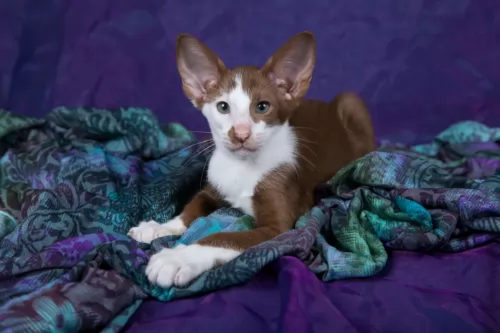 These cats with a triangular-shaped head and slender, long body have a fairly thin tail. The ears are widely set and are large. The eyes are green, but blue with the colorpoint varieties.
These cats with a triangular-shaped head and slender, long body have a fairly thin tail. The ears are widely set and are large. The eyes are green, but blue with the colorpoint varieties.
The coat is short, close-lying and sleek while the coat of the long-haired variety is fine and silky with no thick undercoat. The tail forms a plume. The coat is mostly white and the other part of the coat can be in any other color. You’ll always see quite a bit of white around the legs.
These cats are suited for singles, couples, families, and seniors - in fact, anyone still active enough to provide this cat with lots of attention.
These vibrant cats are known for their social, friendly and loving personality. They are intelligent, inquisitive, active cats that need to have plenty of interaction with their human family members. They love their human family and love to hold conversations with them.
They're entertaining too, and love nothing more to ve the center of attention. They're so into their human family that you may even have him waiting patiently for you to come home fro work. He shouldn't be left alone for hours on end and should rather have a pet friend to keep him company during the day.
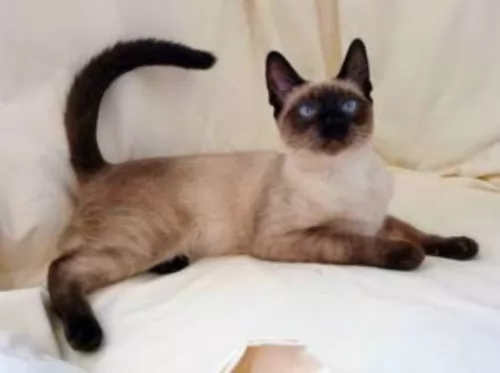 The Thai is a short-haired, glossy cat and comes in a variety of colors but no white.
The Thai is a short-haired, glossy cat and comes in a variety of colors but no white.
The soft, silky fur is a warm cream shade, much like the Siamese, with dark brown, black, smoky colored extremities.
The Thai is considered to be a medium-sized cat and he will weigh between 3 an 6kg. The body is lean, slender and muscular, the ears medium size with rounded tips and set wide apart. The eyes are are beautiful blue, large and slightly slanted.
Thai cats are curious, active, and intelligent. They are also social and vocal and are able to communicate to their human owners what they want.
They thrive on getting lots of attention from their humans and will even follow them around the house. They do well with children in the home when the children have been taught to be kind and respectful to animals.
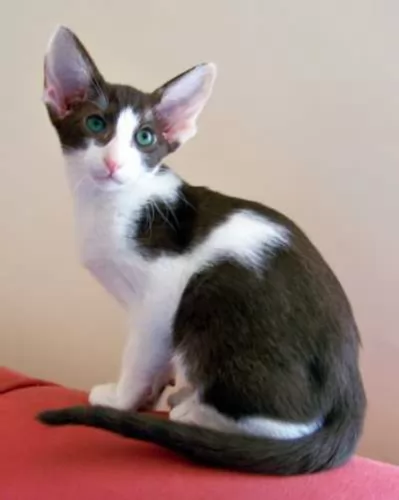 The Oriental Bicolor is such a wonderful pet to have. They are intelligent, entertaining, loving, active, playful, and inquisitive.
The Oriental Bicolor is such a wonderful pet to have. They are intelligent, entertaining, loving, active, playful, and inquisitive.
They’re also athletic and energetic. These cats have got all the characteristics you want in a good friend. They make a fantastic companion to people who are active and happy. They’re also very vocal and have a lot to say to their human family.
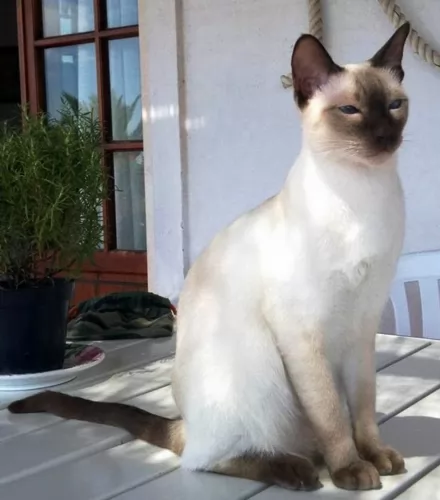 The Thai cat is social and friendly and enjoys time spent with his human family. They don’t like to be left alone for long periods of time and it just might be a good idea to have a feline friend for this cat.
The Thai cat is social and friendly and enjoys time spent with his human family. They don’t like to be left alone for long periods of time and it just might be a good idea to have a feline friend for this cat.
He is also a vocal cat and lets you know his feelings and certainly when he wants his food. The Thai wants to be your friend and companion and he will thrive in any kind of home when he is made to feel important and loved.
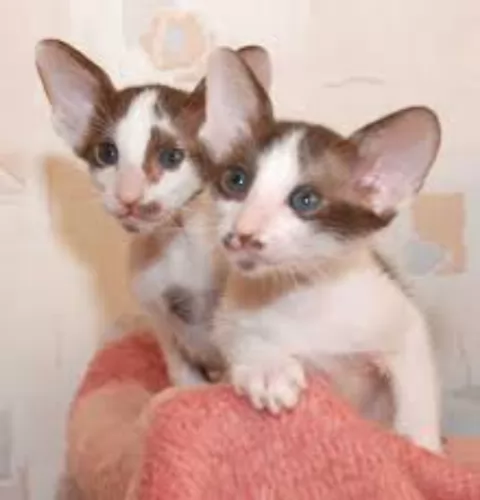 Any cat can develop health problems. Even kittens that come with a certificate of health can develop illnesses that you never thought possible.
Any cat can develop health problems. Even kittens that come with a certificate of health can develop illnesses that you never thought possible.
Orientals are generally healthy cats, but the health issues that may affect the Oriental are similar to that of the Siamese cat.
One of these is Progressive Retinal Atrophy (PRA). This is a genetic eye problem that can lead to blindness. Another disease to look out for is Asthma. The Siamese is susceptible to this disease which means your Oriental Bicolor will also be. You will have to get your furry friend to the vet who may precribe anti-inflammatory drugs.
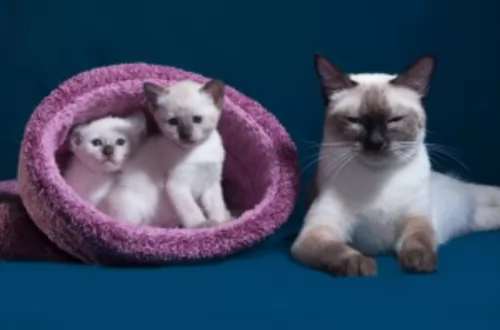 These cats are known for their good health. Just because he is considered healthy, you can't ignore looking out for signs that he may be in distress.
These cats are known for their good health. Just because he is considered healthy, you can't ignore looking out for signs that he may be in distress.
There are actually a whole lot of common cat illnesses your cat could succumb to, so you want to be sure you recognize some of the signs such a vomiting, diarrhea, lethargy, and battling to urinate. Make sure that the eyes are always bright and clear and that he is his active self.
Have your Thai cat vaccinated against the deadly cat diseases that there are. You will also need to have your cat dewormed. Speak to your vet about the best way to prevent fleas.
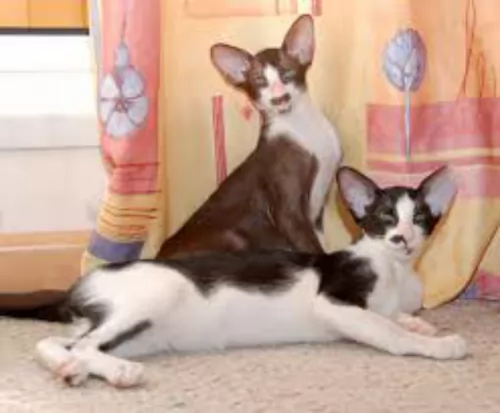 The Oriental Bicolor will require a brushing once a week. A good idea is to also take a warm, damp cloth and to wipe your cat down. It’s an excellent way to rid your cat of loose hairs as well as dust. The cat has a sparse coat, so brush him gently.
The Oriental Bicolor will require a brushing once a week. A good idea is to also take a warm, damp cloth and to wipe your cat down. It’s an excellent way to rid your cat of loose hairs as well as dust. The cat has a sparse coat, so brush him gently.
Other grooming requires nail clipping and checking inside his ears. If you clean his ears, be careful not to go deep into the ear. It is precisely why so many cat owners take their cat to the pet groomers where they can do these things professionally.
It’s very important to keep your Bicolor’s litter box spotlessly clean because like most cats, they won’t use their litterbox if it’s still got yesterday’s feces in it. It needs to be cleaned every day.
The Oriental’s diet is much like that of other cats – it has to be meaty. You can’t afford to not understand your feline pet’s dietary needs. Cats are carnivorous and they need commercial cat food that will be equal to fresh meat that they would normally find in the wild.
They need foods high in protein but they will still need some carbohydrates, amino acids, and vitamins, and minerals. Always go for the best quality pet cat foods because by buying the poorer quality ones you put your cat at risk of developing health problems. Never ever leave your cat without a constant supply of fresh, cool drinking water.
Supply your cat with all the things that make it a pleasure to have a cat. You don’t want to bring your pet home and only then start looking for things to make him at home. He’ll need food and water bowls, a nice warm, soft bed, a litter box, grooming accessories, collar, toys climbing tree and scratching pole.
Have your pet neutered or spayed to prevent unwanted kittens.
Make sure he is taken to the vet when ill. You shouldn't own a pet if you can't afford to pay vet fees. There are some cat illnesses that can make your cat very sick and uncomfortable. He should have his vaccines and also be treated for parasites.
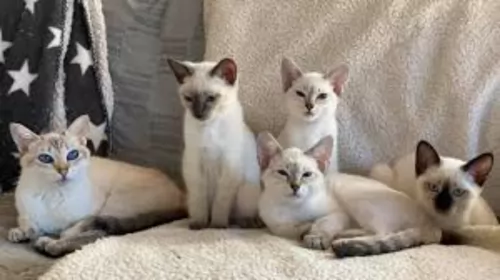 You’ll see your Thai cat preening and grooming, but he will still need to have the silky coat brushed gently to keep it shiny and healthy.
You’ll see your Thai cat preening and grooming, but he will still need to have the silky coat brushed gently to keep it shiny and healthy.
The brushing will make him happy as he just loves the attention, and it is good for the cat’s fur – to remove dust and loose hairs.
Your Thai cat is a scratcher just like any other cat, and if you don’t want to have your furniture scratch, invest in a scratching post.
Examine the inside of your cat’s ears to make sure they are clear of dirt and wax that could cause infection.
Some people say you should brush your cat’s teeth, but this can be too traumatic for your cat. Pets have always done well without their teeth being brushed. It can frighten your cat so much, he’ll want to scratch you.
Your Thai is an active, energetic cat, and you will want to provide him with a cat tree for climbing.
Provide your cat with feeding- and drinking bowls, litter box, warm, soft bed and toys to keep him occupied. It is always a good idea to put a collar on your pet and an ID disc in case he runs away.